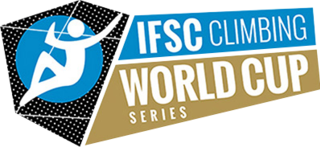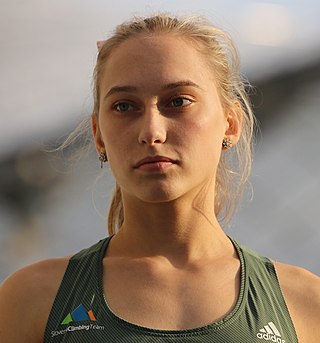
Anna Stöhr is a professional climber. She is a champion in bouldering climbing competitions. She won four Bouldering World Cups, in 2008, 2011, 2012 and 2013 and two World Championships, in 2007 and 2011. Notably, she dominated the 2013 Bouldering World Cup series, by winning seven events out of eight, losing one just by one attempt to Juliane Wurm.

Dmitri Sarafutdinov, also known as Dmitrii Sharafutdinov, is a professional Russian rock climber and competition climber who specializes in competition bouldering. He has won three World Championships, in 2007, 2011 and 2012 and one Bouldering World Cup in 2013.

The IFSC Climbing World Cup is a series of competition climbing events held during the year at various locations around the world, organized by the International Federation of Sport Climbing (IFSC). At each event, the athletes compete in three disciplines: lead, bouldering, and speed. The number of events varies from year to year, and the winners for each discipline are decided by the points accumulated in the year.

Janja Garnbret is a Slovenian professional rock climber who specializes in sport climbing and competition climbing. She has won multiple competition lead climbing and competition bouldering events, two Olympic gold medals, and is widely regarded as the greatest competition climber of all time. In 2021, Garnbret became the first-ever female Olympic gold medalist in climbing, and successfully defended her title in 2024. With two gold medals, she is the most successful Slovenian athlete at the Summer Olympics. She is also the world's first-ever female climber to onsight an 8c (5.14b) graded sport climbing route.

Jakob Schubert is an Austrian professional rock climber, specializing in competition climbing, sport climbing, and bouldering. He is a four-time World Champion and three-time World Cup winner in lead climbing. He is a two-time Olympic bronze medalist in the combined event.

Kilian Fischhuber is a professional Austrian rock climber who specializes in bouldering, sport climbing and competition climbing, where competes in bouldering and lead climbing. From 2005 to 2011, he won five Bouldering World Cups. No other male climber was ever able to win it more than three times, or win it three times in a row. Due to his outstanding career, he was awarded the La Sportiva Competition Award in 2009, together with Chris Sharma.

The 2018 IFSC Climbing World Championships, the 15th edition, were held in Innsbruck, Austria from 6 to 16 September 2018. The championships consisted of lead, speed, bouldering, paraclimbing, and combined events.
The 2018 IFSC Climbing World Cup was held in 14 locations. There were 22 events: 7 bouldering, 7 lead, and 8 speed events. The season began on 13 April in Meiringen, Switzerland, and concluded on 28 October in Xiamen, China.
The 2016 IFSC Climbing World Cup was held in 16 locations. Bouldering, lead and speed competitions were held in 7 locations. The season began on 15 April in Meiringen, Switzerland and concluded on 27 November in Kranj, Slovenia.
The 2015 IFSC Climbing World Cup was held in 13 locations. Bouldering competitions were held in 5 locations, lead in 7 locations, and speed in 5 locations. The season began on 17 May in Central Saanich, Canada and concluded on 15 November in Kranj, Slovenia.
The 2014 IFSC Climbing World Cup was held in 16 locations. Bouldering competitions were held in 8 locations, lead in 8 locations, and speed in 7 locations. The season began on 26 April in Chongqing, China and concluded on 16 November in Kranj, Slovenia.
The 2013 IFSC Climbing World Cup was held in 19 locations. Bouldering competitions were held in 8 locations, lead in 8 locations, and speed in 7 locations. The season began on 22 March in Chongqing, China and concluded on 17 November in Kranj, Slovenia.
The 2012 IFSC Climbing World Cup was held in 17 locations. Bouldering competitions were held in 6 locations, lead in 9 locations, and speed in 6 locations. The season began on 13 April in Chongqing, China and concluded on 18 November in Kranj, Slovenia.
The 2010 IFSC Climbing World Cup was held in 15 locations. Bouldering competitions were held in 7 locations, lead in 6 locations, and speed in 7 locations. The season began on 30 April in Trento, Italy and concluded on 14 November in Kranj, Slovenia.
The 2009 IFSC Climbing World Cup was held in 14 locations. Bouldering competitions were held in 5 locations, lead in 6 locations, and speed in 4 locations. The season began on 11 April in Kazo, Japan and concluded on 15 November in Kranj, Slovenia.
The 2008 IFSC Climbing World Cup was held in 15 locations. Bouldering competitions were held in 7 locations, lead in 6 locations, and speed in 6 locations. The season began on 18 April in Hall, Austria and concluded on 16 November in Kranj, Slovenia.
The 2007 IFSC Climbing World Cup was held in 18 locations. Bouldering competitions were held in 7 locations, lead in 8 locations, and speed in 6 locations. The season began on 30 March in Erlangen, Germany and concluded on 18 November in Kranj, Slovenia.
The 2019 season of the IFSC Climbing World Cup was the 21st season of the competition. Bouldering competitions were held at six stops of the IFSC Climbing World Cup. The bouldering season began on April 5 at the World Cup in Meiringen, and concluded on June 8 with the World Cup in Vail. At each stop a qualifying was held on the first day of the competition, and the semi-final and final rounds were conducted on the second day of the competition. The winners were awarded trophies, and the best three finishers received medals. At the end of the season an overall ranking was determined based upon points, which athletes were awarded for finishing in the top 30 of each individual event.
The 2005 UIAA Climbing World Championships, the 8th edition, were held in Munich, Germany from 1 to 5 July 2005. It was organized by the Union Internationale des Associations d'Alpinisme (UIAA). The championships consisted of lead, speed, and bouldering events.
Competition lead climbing at the 2021 IFSC Climbing World Cup was held at five locations, from 23 June to 4 September 2021. The International Federation of Sport Climbing had initially scheduled six competition-lead climbing events concluding on 17 October, but COVID-19 travel restrictions resulted in the cancellation of the event in Xiamen, China.






